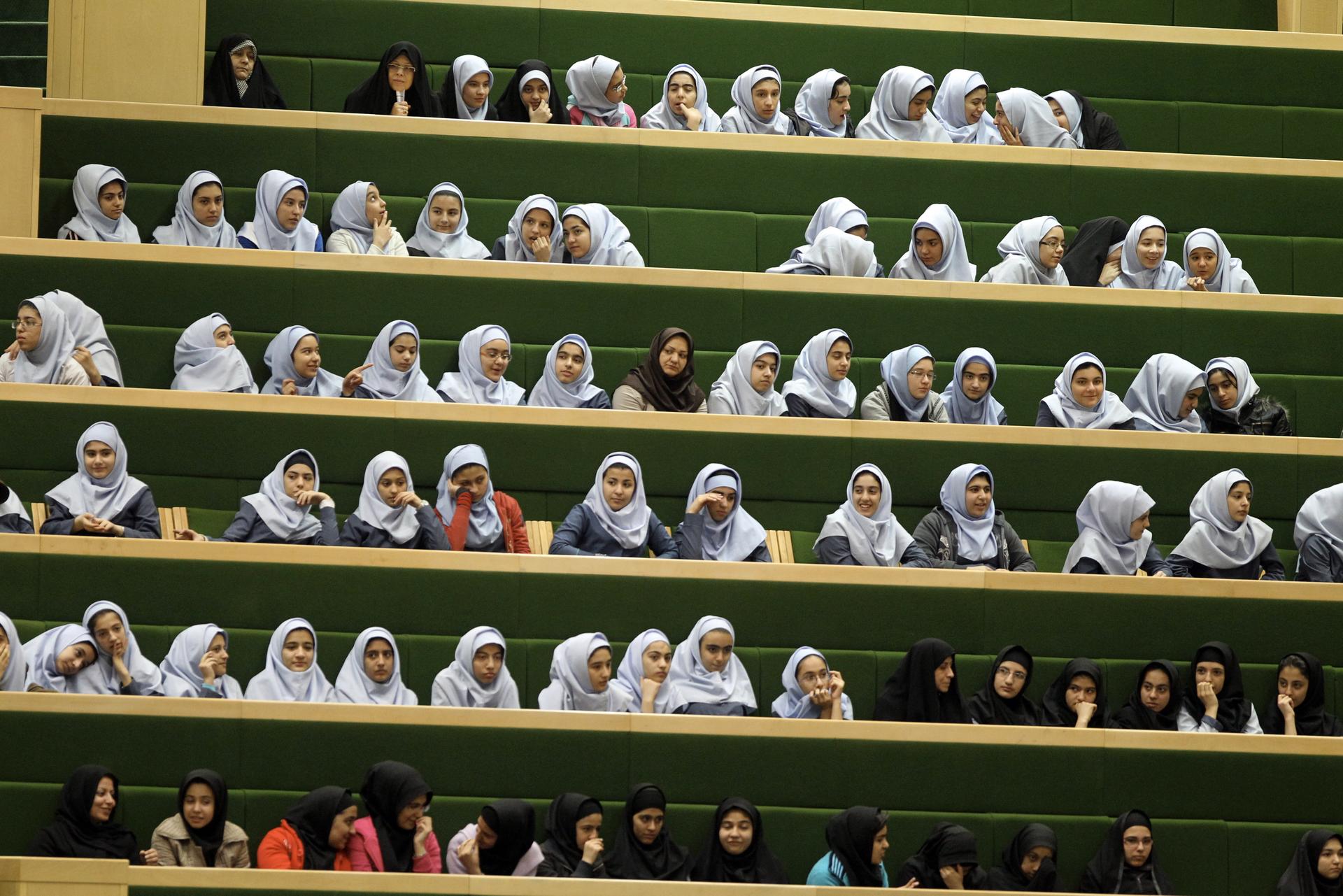Iranians march in Tehran to mourn those killed in protests
Iranian schoolgirls listens to Iranian President Mahmoud Ahmadinejad addressing MPs during a parliamentary session where he presented the annual budget bill in Tehran on February 20, 2011.
BOSTON — Supporters of the so-called Green Movement opposition in Iran were back on the streets Sunday, observing the traditional Shiite seven-day mourning period for the death of two young protesters killed last Tuesday in Tehran.
Protesters gathered at the IRIB (Islamic Republic of Iran Broadcasting) headquarters in Jame Jam, and other areas such as Vali Asr, Par Way, and Sohrevardi streets. BBC Persian reported that tear gas had been used.
The speed of internet had dropped on Saturday, according to sources in Tehran.
Saneh Jaleh and Mohammad Mokhtari were shot and killed last week during a protest in Tehran called by the opposition leaders Mir-Hossein Mousavi and Mehdi Karoubi in support of the Egyptian protesters. The demonstration took a violent turn when government officials refused to issue a permit and deployed security forces to stop demonstrators from gathering.
The Iranian government claims that Jaleh, who was from the Iranian Kurdish minority and studied theater at Tehran University, was a member of the volunteer security forces, also known as the Basiji, and a martyr killed at the hands of the opposition.
Hussein Shariatmadari, editor in chief of Kayhan newspaper, known as a mouthpiece of the Supreme Leader, went on Iranian TV to claim that Jaleh worked as an informant for the outlet.
His brother, however, in an interview with Voice of America flatly denied that Jaleh was a member of the Basiji militia. And photos of Jaleh have emerged showing him at the Late Grand Ayatollah Montazeri’s house. Montazeri has for many years been one of the government's most prominent critics — proof, say opposition leaders, that he was against the government, and not a Basiji.
Online social media sites were flooded with messages of disbelief at attempts to link Jaleh to the government forces.
“They stole our votes, and now they steal our martyr,” said one Facebook user.
Another wrote: “I was not, am not, and never will be a Basiji. If I die on Sunday, I want the world to know that.”
Meanwhile, the Iranian government went on a campaign to isolate the leaders of opposition.
“Members of the opposition should be imprisoned in their homes, and all connection to the outside world must be cut off from them,” the head of the Guardian Council, Ahmad Janati, said at the Friday prayers last week.
Since that speech, Karoubi and Mousavi have been under house arrest, without access to the outside world. Mousavi’s daughters told Rahe Sabz, a website run by members close to him, that they had no news of their parents, and that security forces had closed off entrance to the street leading to his house.
On Saturday the same website reported that an “iron wall” was erected at the entrance of the street with “masked men” blocking any commute.
It was only late Saturday that daughters of Mousavi announced they had briefly talked to their parents, and were assured they were in good health. They also said that security forces were in charge of bringing food to Mousavi and his wife, Zahra Rahnavard.
“They couldn’t take Mousavi and Karoubi to Evin prison, so they brought Evin to them,” a journalist in Tehran told GlobalPost.
According to the journalist, the Iranian government has refrained from taking the leaders into custody owing to fears of turning them into national heroes.
Last year, Mojtaba Zulnur, a Revolutionary Guard commander, openly admitted as much, saying that once put in Evin prison, “if their soup gets cold, they [supporters] would be at our throats.”
Supporters of the government have also been flexing their muscles. After the Friday prayers last week, they took to the streets to ask the government to deal with the opposition once and for all. They demanded that Mousavi and Karoubi be executed.
Protesters in the northwestern city of Tabriz staged a mock hanging on Saturday, using Mousavi and Karoubi effigies, according to a report by semi-official Fars News. State TV also went on the streets of Kermanshah’s city of Paveh, where Jaleh hailed from, and interviewed those attending a pro-government rally. Protester after protester demanded trial and imprisonment for the opposition leaders. A few, including a chador-clad woman called for their execution saying it’s well deserved because “they are killing our children.”
President Mahmoud Ahmadinejad and Iran's Supreme Leader, Ayatollah Ali Khamenei, have been reserved in comments on the apparent resurgence of the Green Movement, first formed in the aftermath of the disputed 2009 presidential election. Ahmadinejad briefly touched on the issue in a TV appearance, but quickly went on to discuss other topics.
Calling the protests works of foreign enemies, he added: “It’s as if they [opposition] throw dust at the sun. It circles back onto their own faces.”
Every day, reporters and producers at The World are hard at work bringing you human-centered news from across the globe. But we can’t do it without you. We need your support to ensure we can continue this work for another year.
Make a gift today, and you’ll help us unlock a matching gift of $67,000!
